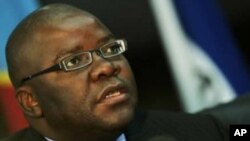The two main parties to Zimbabwe's fractious national unity government - President Robert Mugabe's ZANU-PF and the Movement for Democratic Change formation of Prime Minister Morgan Tsvangirai - both claimed to have prevailed in the Southern African Development Community summit that ended Tuesday in Windhoek, Namibia.
ZANU-PF party sources said they were pleased SADC undertook in its communique to call for the removal of Western sanctions. The party said it welcomes SADC's decision to conduct a six-month review of the SADC tribunal, which the ZANU-PF side of the Zimbabwean government has repudiated over a decision that favored white farmers who lost their land under the fast-track and often chaotic and violence land reform process launched in 2000.
Justice Minister Patrick Chinamasa, lead negotiator for ZANU-PF in three-way negotiations among the parties to the unity government established in 2009, said the tribunal was being abused by certain countries to spite Harare.
Chinamasa was quoted by the ZANU-PF-leaning Zimbabwe Broadcasting Corporation as saying SADC needs a tribunal that is founded on a proper legal basis with a clearly defined mandate and jurisdiction, arguing that “clearly there was mischief afoot, there was someone with dishonest intentions, very bad intentions, who wanted this tribunal to be made operational prematurely and of course those people are not accepting their mistakes and they have been arguing that their mistake be accepted at the expense of Zimbabwe, and we are saying no."
Chinamasa added that “we should accept the logic of the fact that a treaty does not come into operation unless ratified and if you follow that logic it means that the whole tribunal, its sittings are a nullity and some people are not quite ready to accept that consequence of illegality."
The Movement for Democratic Change said the SADC summit communiqué did not sufficiently capture its demands to the regional authority, but MDC officials laid heavy emphasis on a report by South African President Jacob Zuma, the mediator in Harare for SADC, which noted the need for what the MDC describes as an "exit strategy" from the transitional power-sharing arrangement put in place following disastrous 2008 elections.
The party said the exit strategy has three components: completion of the constitutional revision process, a national referendum to approve that constitution, and new elections presidential and general elections.
The MDC noted that the full summit adopted Mr. Zuma’s proposals as to the culmination of power-sharing.
In Harare, Finance Minister Tendai Biti, secretary general of Mr. Tsvangirai's MDC formation, told reporters that Mr. Zuma said the unity parties should fully implement the 2008 Global Political Agreement - the basis for the power-sharing government now in place in Harare - with a view to eventual free and fair elections.
Biti in his remarks to the news conference encouraged incoming SADC Chairman President Hifikepunye Pohamba of Namibia to ensure there was compliance with all the resolutions of the SADC summit.
“The facilitator’s report and recommendations were endorsed and accepted by the full summit and we express our great appreciation" to SADC and its leadership. "It is now critical for flesh to be put into the summit decisions."
Biti said implementation of the SADC resolution "is the only answer to the successful restoration of legitimacy to this country." The MDC secretary general told reporters that SADC had given parties in the unity government one month to resolve the outstanding issues troubling their power-sharing arrangement.
SADC Executive Secretary Tomaz Salomao dismissed media reports saying the SADC tribunal had been suspended by the summit, explaining that it will be under review for the next six months.
Johannesburg-based political analyst Joy Mabenge said nothing much could have been expected from the SADC regional authority as it has too many issues to deal with besides Zimbabwe.





